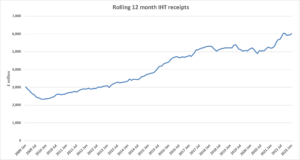
The question marks hanging over inheritance tax (IHT) have disappeared, but as the impact of the tax on individuals and families is growing, there are strategies to mitigate your liability.

Source: Office for National Statistics
When the then Chancellor, Philip Hammond, asked the Office of Tax Simplification (OTS) back in January 2018 to consider how to simplify IHT, two reports followed. The second, issued in July 2019, proposed a range of significant reforms to the tax. Almost immediately after its publication, the subject of IHT simplification disappeared into a Treasury black hole. Budgets passed with no mention of the OTS’s efforts, making it difficult to give long term IHT advice.
Finally, on the last day of November 2021, clarification emerged in a letter from the Treasury to the OTS which stated “…the Government has decided not to proceed with any [IHT] changes at the moment, but will bear your very valuable work in mind if the Government considers reform of IHT in the future”.
The long-awaited response has brought certainty about the IHT framework – at least until the next election. However, by the time the Treasury had said “thanks, but no thanks” to the OTS, the current Chancellor had frozen the IHT nil rate bands until at least April 2026. By then the main nil rate band will have been stuck at £325,000 for no less than 17 years.
As many people are starting to learn from the freezing of the personal allowance (also to 2026), inflation turns a freeze into a tax increase. The results of the nil rate band freeze are shown in the above graph: between January 2009 and January 2022 IHT receipts rose by 98% while prices increased by 35%.
Mitigating strategies
In highlighting several features of the current IHT rules that it felt needed reform, ironically the OTS report supplied a list of planning opportunities worth considering. These included:
- Normal expenditure gifts If you make gifts that are:
- regular;
- out of your income (including ISA income); and
- do not reduce your standard of living
then they are exempt from IHT, regardless of their size. In its second report the OTS said it had heard “…from a few respondents that the exemption has on occasion been used to exempt gifts worth more than £1 million for individuals with a very high annual income”.
At more modest levels the exemption could mean, for example, that if your regular spending pattern has fallen because of the pandemic, you could use the savings to make gifts free of IHT. Similarly, any investment income usually automatically reinvested is a potential source of normal expenditure gifts.
- Outright lifetime gifts Outright gifts suffer no immediate IHT liability and are free of IHT if you survive seven years after making them. If you do not reach the seven-year point, any IHT liability on the gift is reduced by 20% per year from the start of the fourth year, e.g. at five and a half years only 40% of the full IHT is payable on death. The OTS had proposed that the sliding scale of tax should be abolished, commenting that “taper relief is complicated and not well understood”.
- Pensions While the OTS did not make any specific recommendations on the IHT treatment of pensions, its report did say “…it appears anomalous that some pension policies can be included within an estate for Inheritance Tax purposes while other comparable pension savings are not”. The pension flexibility regime introduced in 2015 has increased the value of some pension arrangements in IHT planning.
If you would like to discuss the above with one of our experienced financial planners, please get in touch here.
The value of tax reliefs depends on your individual circumstances. Tax laws can change. The Financial Conduct Authority does not regulate tax advice.





